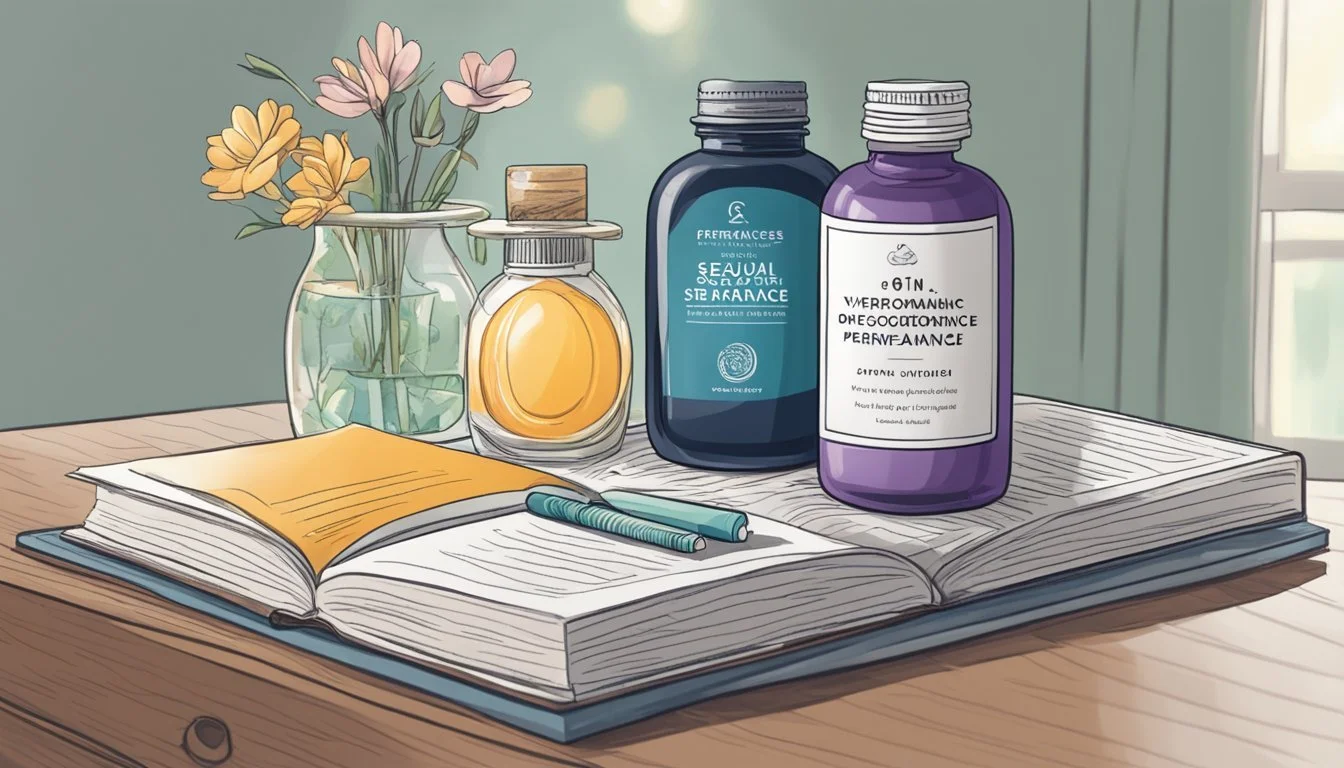6 Strategies for Overcoming Sexual Performance Anxiety
Expert Tips for Confidence and Comfort
Sexual performance anxiety is a common issue affecting both men and women, often leading to stress and reduced sexual satisfaction. Such anxiety can stem from various causes, including societal pressures and personal insecurities, which can inhibit one's ability to perform sexually.
Understanding how to effectively manage and overcome sexual performance anxiety is crucial for maintaining a healthy and fulfilling sexual relationship. Many strategies exist to address this problem, ranging from open communication with partners to incorporating mindfulness practices. This article will explore six practical methods to help individuals conquer their performance-related fears and enhance their intimate experiences.
1) Practice Mindfulness Techniques
Mindfulness can play a significant role in overcoming sexual performance anxiety. By focusing on the present moment and letting go of worries about past experiences or future performance, individuals can reduce stress and enjoy their intimate interactions more fully.
Breathing exercises are one effective mindfulness technique. Deep, slow breathing helps to calm the nervous system and can reduce anxiety. Focusing on the breath allows the mind to stay in the present, which can be especially helpful during intimate moments.
Meditation is another useful mindfulness practice. Regular meditation trains the mind to stay focused and present. This can help reduce the tendency to become distracted by anxious thoughts during sexual activity. Over time, this practice can make it easier to maintain a relaxed and connected state with a partner.
Incorporating mindfulness into daily routines can also be beneficial. Activities like yoga, tai chi, or simple mindful walking can enhance overall mindfulness and reduce stress levels, which can positively impact sexual experiences.
Individuals can explore more specific strategies such as maintaining gentle awareness during intimate moments, as suggested in articles like those on Psychology Today.
Regular mindfulness practice can transform sexual experiences by providing a greater sense of control over thoughts and emotions. This approach promotes a deeper connection with one's self and partner, paving the way for more fulfilling and anxiety-free intimacy.
2) Communicate openly with your partner
Open communication is essential in addressing sexual performance anxiety. Discussing feelings, preferences, and concerns with a partner can create a supportive environment. This mutual understanding can alleviate stress and reduce anxiety.
Talking about needs and desires helps both partners feel more connected. When partners share their expectations and listen actively, it builds trust and eliminates misunderstandings.
Honesty about any use of performance-enhancing medications, like Viagra, ensures transparency. This openness can bolster confidence and remove feelings of embarrassment or inadequacy.
Acknowledging vulnerability and seeking help together strengthens bonds. Partners can work as a team to navigate challenges, fostering a healthier sexual relationship.
For more insights on communication strategies, visit BetterHelp and Medvidi.
3) Focus on Non-Sexual Intimacy
Non-sexual intimacy plays a crucial role in strengthening relationships and reducing performance anxiety. This type of intimacy includes activities that foster closeness without sexual pressure.
Couples can engage in activities like cuddling, holding hands, or simply spending quality time together. These actions encourage emotional bonding and create a safe space for both partners.
One effective method to enhance non-sexual intimacy is the Sensate Focus exercise. This involves partners taking turns to touch each other non-sexually, building physical closeness while eliminating performance-related pressure.
Open communication about desires and boundaries is essential. Sharing positive, non-critical feedback helps foster a supportive environment, reducing anxiety related to sexual encounters.
Prioritizing non-sexual forms of affection can reframe the relationship's focus towards emotional and physical intimacy, allowing partners to feel more connected and less pressured. This shift can significantly alleviate the stress associated with sexual performance.
Engaging in activities like cooking together, taking walks, or enjoying mutual hobbies also contributes to non-sexual intimacy. These shared experiences reinforce the partnership's strength, further reducing anxiety and promoting a healthier bond.
Maintaining consistent non-sexual closeness helps build trust and security. This foundation supports a more relaxed and confident approach to sexual interactions.
4) Seek Professional Therapy or Counseling
Professional therapy or counseling can be an effective way to address sexual performance anxiety. Therapists provide a safe and confidential space to discuss concerns related to sexual anxiety and performance issues.
Engaging with a therapist can help individuals identify the root causes of their anxiety. This understanding often leads to the development of personalized coping strategies tailored to an individual's specific needs.
Cognitive-behavioral therapy (CBT) is a common approach used in addressing sexual performance anxiety. CBT focuses on changing negative thought patterns and behaviors that contribute to anxiety.
A therapist may also teach relaxation techniques, such as deep breathing and progressive muscle relaxation. These techniques can be helpful when managing physical symptoms of anxiety during sexual activity.
Communication is another crucial aspect covered in therapy. Therapists often work with individuals and couples to improve communication skills, fostering a supportive environment that can alleviate performance pressure.
For those interested, online therapy platforms like BetterHelp offer accessible options to connect with licensed therapists specializing in sexual anxiety.
Individuals should consider exploring therapy if they feel their anxiety is significantly impacting their sexual relationships and overall well-being.
5) Try relaxation exercises
Relaxation exercises can help reduce anxiety by calming the mind and body. Techniques such as deep breathing, progressive muscle relaxation, and guided imagery can be effective. These exercises lower stress levels, making it easier to focus during intimate moments.
Deep breathing involves taking slow, deep breaths to oxygenate the body and reduce tension. He or she can practice this before or during sexual activity.
Progressive muscle relaxation entails tensing and slowly releasing different muscle groups. This helps in understanding physical tension and releasing it systematically.
Guided imagery involves visualizing peaceful and relaxing scenes. It can shift the focus from performance anxiety to a more soothing mental space.
Practicing these exercises regularly can build resilience against anxiety. They can also be combined with other strategies like mindfulness and yoga. By making relaxation exercises a part of daily routine, individuals may find it easier to manage stress and improve their sexual performance.
6) Use Performance-Enhancing Products
Several performance-enhancing products can assist in reducing sexual performance anxiety. These products can address physical symptoms that often accompany anxiety, such as erectile dysfunction or reduced stamina.
Medication like sildenafil can help men achieve and maintain an erection. Over-the-counter supplements, such as L-arginine, may support blood flow and improve sexual performance.
Devices like vacuum erection pumps can also be effective. These devices increase blood flow to the penis, helping achieve and maintain an erection.
Topical creams and gels can provide additional stimulation. These products are applied directly to the genital area, enhancing sensitivity and performance.
Using performance-enhancing products should be approached carefully. Consulting with a healthcare provider ensures safety and appropriateness for individual needs.
Exploring these options can offer additional support. Addressing both physical and psychological aspects of performance anxiety is essential for overall improvement.
Understanding Sexual Performance Anxiety
Sexual performance anxiety involves various aspects, including specific behavioral symptoms and identifiable underlying causes.
Definition and Symptoms
Sexual performance anxiety is the fear or worry of not being able to perform sexually, often leading to physical and emotional challenges.
One primary symptom includes experiencing premature ejaculation or difficulty maintaining an erection in men. Women may find it hard to orgasm or show little interest in sexual activities. Physical symptoms may vary, such as increased heart rate, sweating, or nausea before engaging in sexual acts.
Additionally, individuals may experience panic attacks or intense fear of sexual failure. This anxiety can significantly impact one's quality of life and relationships.
Common Causes and Triggers
Several factors can lead to sexual performance anxiety. One key cause is stress and pressure related to pleasing a partner or societal expectations about sexual performance.
Body image issues such as concerns over weight or physical appearance can also foster anxiety. Relationship problems may exacerbate these fears, causing an individual to worry about their ability to satisfy their partner.
Furthermore, past traumatic sexual experiences or personal insecurities often contribute to this anxiety. Psychological conditions like generalized anxiety disorder or depression can also amplify these stressors, creating a cycle that's hard to break.
Identifying these triggers is crucial for addressing and managing sexual performance anxiety effectively.
Psychological Factors
Psychological factors play a significant role in sexual performance anxiety. These include mental health issues and the stress or anxiety that individuals may experience.
Impact of Mental Health
Mental health conditions, such as depression and anxiety disorders, can negatively affect sexual performance. Depression can reduce libido and make it difficult for individuals to feel aroused or engaged during sexual activity. Anxiety disorders can lead to a preoccupation with worries, diminishing sexual desire and performance.
For those with mental health conditions, sexual performance anxiety may manifest as a fear of inadequacy or failure. This can create a vicious cycle where anxiety worsens performance, which in turn increases anxiety. Therapy, such as cognitive-behavioral therapy (CBT), can be effective in addressing these concerns.
Sexual education and open communication with a partner can also help alleviate some of the psychological pressures associated with mental health issues.
Role of Stress and Anxiety
Stress and anxiety are major contributors to sexual performance anxiety. The pressures of daily life, including work, personal relationships, and financial concerns, can preoccupy the mind, leaving little room for sexual activity. Stress can cause the body to release hormones like cortisol, which can negatively impact sexual performance.
Specific fears related to sex, such as fear of not satisfying one's partner or fear of negative judgment, can exacerbate performance anxiety. Mindfulness practices, such as yoga and meditation, can help reduce stress levels and improve sexual experiences.
Open discussions with a sexual partner about these anxieties can also be beneficial, fostering a supportive environment that reduces overall stress. Stress management techniques are crucial in overcoming sexual performance anxiety.
Physical Factors
Physical factors play a crucial role in sexual performance anxiety. Identifying and addressing these factors can help alleviate anxiety and improve sexual function.
Health Conditions Affecting Performance
Several health conditions can impact sexual performance. Cardiovascular diseases can reduce blood flow and contribute to erection difficulties in men. Diabetes can damage nerves and blood vessels, affecting sexual response in both men and women.
Obesity can also be a contributing factor, as it often leads to decreased libido and stamina. Hormonal imbalances, particularly low testosterone levels in men, can reduce sexual desire and performance. Prostate issues and pelvic floor dysfunction are additional factors that may hinder sexual activity.
For women, conditions like endometriosis, polycystic ovary syndrome (PCOS), and pelvic inflammatory disease (PID) can affect sexual function. Addressing these underlying health issues with medical intervention can significantly improve sexual performance and reduce anxiety.
Medications and Side Effects
Various medications can have side effects that impact sexual performance. Antidepressants, particularly selective serotonin reuptake inhibitors (SSRIs), can lead to a lowered sex drive and difficulty achieving orgasm. Blood pressure medications such as beta-blockers and diuretics may cause erectile dysfunction.
Antihistamines and antipsychotics are other common categories of drugs that can interfere with sexual arousal and performance. In women, certain hormonal contraceptives may reduce libido due to changes in hormone levels.
It's important for individuals to consult healthcare providers to discuss any side effects experienced. Adjusting dosages or switching medications can often mitigate these unwanted effects, helping to improve sexual function and alleviate performance anxiety.




